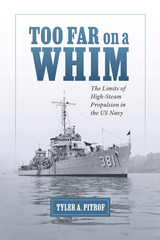112 books about Enlightenment and 4
start with H
112 books about Enlightenment and 4
112 books about Enlightenment
4 start with H start with H
4 start with H start with H
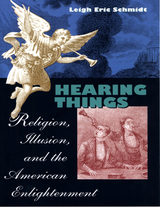
Hearing Things
Religion, Illusion, and the American Enlightenment
Leigh Eric Schmidt
Harvard University Press, 2002
“Faith cometh by hearing”—so said Saint Paul, and devoted Christians from Augustine to Luther down to the present have placed particular emphasis on spiritual arts of listening. In quiet retreats for prayer, in the noisy exercises of Protestant revivalism, in the mystical pursuit of the voices of angels, Christians have listened for a divine call. But what happened when the ear tuned to God’s voice found itself under the inspection of Enlightenment critics? This book takes us into the ensuing debate about “hearing things”—an intense, entertaining, even spectacular exchange over the auditory immediacy of popular Christian piety.The struggle was one of encyclopedic range, and Leigh Eric Schmidt conducts us through natural histories of the oracles, anatomies of the diseased ear, psychologies of the unsound mind, acoustic technologies (from speaking trumpets to talking machines), philosophical regimens for educating the senses, and rational recreations elaborated from natural magic, notably ventriloquism and speaking statues. Hearing Things enters this labyrinth—all the new disciplines and pleasures of the modern ear—to explore the fate of Christian listening during the Enlightenment and its aftermath.In Schmidt’s analysis the reimagining of hearing was instrumental in constituting religion itself as an object of study and suspicion. The mystic’s ear was hardly lost, but it was now marked deeply with imposture and illusion.
[more]
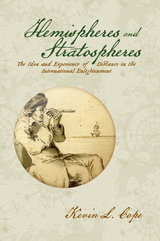
Hemispheres and Stratospheres
The Idea and Experience of Distance in the International Enlightenment
Kevin L. Cope
Bucknell University Press, 2021
Recognizing distance as a central concern of the Enlightenment, this volume offers eight essays on distance in art and literature; on cultural transmission and exchange over distance; and on distance as a topic in science, a theme in literature, and a central issue in modern research methods. Through studies of landscape gardens, architecture, imaginary voyages, transcontinental philosophical exchange, and cosmological poetry, Hemispheres and Stratospheres unfurls the early history of a distance culture that influences our own era of global information exchange, long-haul flights, colossal skyscrapers, and space tourism.
Published by Bucknell University Press. Distributed worldwide by Rutgers University Press.
Published by Bucknell University Press. Distributed worldwide by Rutgers University Press.
[more]
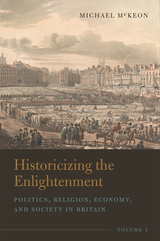
Historicizing the Enlightenment, Volume 1
Politics, Religion, Economy, and Society in Britain
Michael McKeon
Bucknell University Press, 2023
The Enlightenment has been blamed for some of the most deadly developments of modern life: racism and white supremacy, imperialist oppression, capitalist exploitation, neoliberal economics, scientific positivism, totalitarian rule. These developments are thought to have grown from principles that are rooted in the soil of the Enlightenment: abstraction, reduction, objectification, quantification, division, universalization. Michael McKeon’s new book corrects this defective view by historicizing the Enlightenment--by showing that the Enlightenment has been abstracted from its history. From its past: critics have ignored that Enlightenment thought is a reaction against deadly traditions that precede it. From its present: the Enlightenment extended its reactive analysis of the past to its own present through self-analysis and self-criticism. From its future: much of what’s been blamed amounts to the failure of its posterity to sustain Enlightenment principles. To historicize the Enlightenment requires that we conjure what it was like to live through the emergence of concepts and practices that are now commonplace—society, privacy, the public, the market, experiment, secularity, representative democracy, human rights, social class, sex and gender, fiction, the aesthetic attitude. McKeon’s book argues the continuity of Enlightenment thought, its consistency and integrity across this broad range of conceptual domains. It also shows how the Enlightenment has shaped our views of both tradition and modernity, and the revisionary work that needs to be done in order to understand our place in the future. In the process, Historicizing the Enlightenment exemplifies a distinctive historiography and historical method.
Published by Bucknell University Press. Distributed worldwide by Rutgers University Press.
Published by Bucknell University Press. Distributed worldwide by Rutgers University Press.
[more]
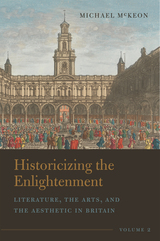
Historicizing the Enlightenment, Volume 2
Literature, the Arts, and the Aesthetic in Britain
Michael McKeon
Bucknell University Press, 2023
Enlightenment critics from Dryden through Johnson and Wordsworth conceived the modern view that art and especially literature entails a double reflection: a reflection of the world, and a reflection on the process by which that reflection is accomplished. Instead “neoclassicism” and “Augustanism” have been falsely construed as involving a one-dimensional imitation of classical texts and an unselfconscious representation of the world. In fact these Enlightenment movements adopted an oblique perspective that registers the distance between past tradition and its present reenactment, between representation and presence. Two modern movements, Romanticism and modernism, have appropriated as their own these innovations, which derive from Enlightenment thought. Both of these movements ground their error in a misreading of “imitation” as understood by Aristotle and his Enlightenment proponents. Rightly understood, neoclassical imitation, constitutively aware of the difference between what it knows and how it knows it, is an experimental inquiry that generates a range of prefixes—“counter-,” “mock-,” “anti-,” “neo-”—that mark formal degrees of its epistemological detachment. Romantic ideology has denied the role of the imagination in Enlightenment imitation, imposing on the eighteenth century a dichotomous periodization: duplication versus imagination, the mirror versus the lamp. Structuralist ideology has dichotomized narration and description, form and content, structure and history. Poststructuralist ideology has propounded for the novel a contradictory “novel tradition”—realism, modernism, postmodernism, postcolonialism—whose stages both constitute a sequence and collapse it, each stage claiming the innovation of the stage that precedes it.
Published by Bucknell University Press. Distributed worldwide by Rutgers University Press.
Published by Bucknell University Press. Distributed worldwide by Rutgers University Press.
[more]
READERS
Browse our collection.
PUBLISHERS
See BiblioVault's publisher services.
STUDENT SERVICES
Files for college accessibility offices.
UChicago Accessibility Resources
home | accessibility | search | about | contact us
BiblioVault ® 2001 - 2024
The University of Chicago Press




